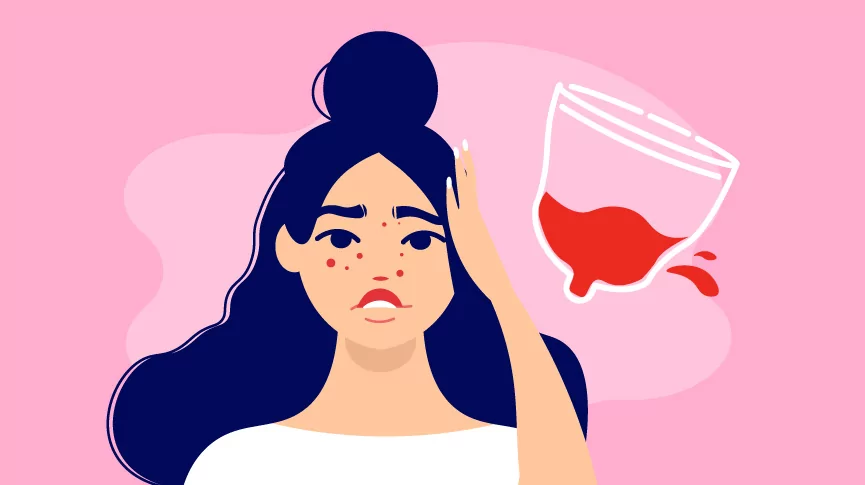4 Bizarre Things That Happen To Your Body On Your Period

Part of being a female is to experience menstrual cycles every month. Yeah, having your periods could mean several things for your body, like your reproductive organs functioning well and, of course, that you are not pregnant. But the side effects of menstrual cycles like bloating, breakouts, or even mood swings can be physically and emotionally taxing — especially a week or two before the periods. You’ll want to hide under the blanket and make that heating pad your best friend, desperately trying to control the outburst of tears as you binge eat. Yes, we’ve all been there and done that. But did you also know that your monthly cycle could deliver a host of bizarre changes in your body? If not, read on to know what these are and how they impact your menstrual cycle:
What Happens To Your Body When You Get Your Period?
Your body can go a bit haywire during your period. These are a result of hormonal fluctuations throughout your menstrual cycle. While they may not impact your physical health or how fertile you are, a wide range of pretty strange things (from outright embarrassing to painful ones) happen to your body when you are menstruating.
So, let’s take a look at four bizarre and surprising — but ‘normal’ things that your body is most likely to undergo when you are going through your period. Some of us may not even be aware that they are a result of that time of the month. Yes, these not-so-fun and less evident side-effects can help you figure out your body’s mechanisms and stay prepared to seek help when things seem unusual or intolerably discomforting. Also, note that we are more prone to feeling the changes in varying degrees, but several unexpected occurrences are indeed on the cards when Aunt Flo comes to town.
A Drop In Your Pain Threshold
Throbbing or menstrual cramping in the lower abdomen are the most common symptoms of menses. They can show up just before or during your menstrual cycle. Menstrual cramps could be caused by the following:
- The formation of noncancerous growths in the uterus wall (uterine fibroids).
- An infection of the female reproductive organs (Pelvic inflammatory disease).
- Abnormal growth of tissue outside the uterus (endometriosis).
That dull, continuous ache can often radiate to your lower back and thighs, coupled with nausea, headache, or dizziness to disrupt your routine for a few days every month.
You Are Unusually Starved
You could also feel insatiably hungry during your periods — wanting to stuff your face with whatever you find within your reach (literally!). It’s crazy, but you may constantly find yourself rummaging through your pantry and hogging on whatever you fancy during your period, no matter how much you eat. This may cause some weight gain during menstruation. But, fret not — it’s temporary and a result of your hormones going for a toss.
Your estrogen levels are generally high during ovulation, but progesterone levels spike up right before your period. Progesterone has been commonly linked to increasing your appetite. In addition to this, a few other hormonal changes during your period cause you to feel famished. These are — high levels of the stress hormone, cortisol (shoots up sugar cravings); low levels of the ‘feel-good’ hormone, serotonin (makes you crave carbohydrates); and a high basal metabolic rate (BMR). Such hormonal alterations do raise your food cravings (usual or unusual) during the menses.
You Are More Forgetful
Many women also complain of feeling a bit foggy while on their period. This could manifest further in being unorganized, slightly indecisive, distracted, clumsy, lacking clarity, and sluggishness. Some factors could be attributed to your loss of alertness — inability to sleep (due to continuous pain), low iron content (responsible for oxygen flow around your body) due to Anaemia, and an imbalance of hormones and neurotransmitters that cause fluid retention and fatigue.
You Take Frequent Visits To The Loo
Another unfortunate side-effect of periods is a recurring urge to poop. It is an unpleasant symptom of chemical signals that trigger a need to go number two. And, prostaglandins could be the ones to blame. They are responsible for the contraction and relaxation of the uterus, which causes the contraction of the bowels and plays an essential role in the secretion of gastric acid. Also, a fluctuation in progesterone levels can result in diarrhoea or constipation, or a combination of both. If you already have digestive issues, chances are, you have a greater chance of running to your nearest bathroom more frequently when on your period.
Everything is normal
Every woman who has been on their menses or gets their period each month knows that a few crazy, weird menstrual symptoms can wreak havoc on their lifestyle. These odd things that happen to your body can be downright annoying, but for some, it could be severe enough to interfere with their day-to-day activities. While some months are okay, some others can be worse. Many of these symptoms manifest differently for different women. Some even share stories of never having experienced any of these! You should know that there is nothing wrong with being curious if that means it’ll make you hale and hearty. If anything causes you to excessively worry, ask your doctor, get yourself tested, and heed their advice.

A collective group of “lady experts” at Intimina who love sharing our personal experiences, even when they are a little too personal. We believe it’s time to start breaking down the taboos around menstruation, motherhood, and menopause, and start owning our female health.


